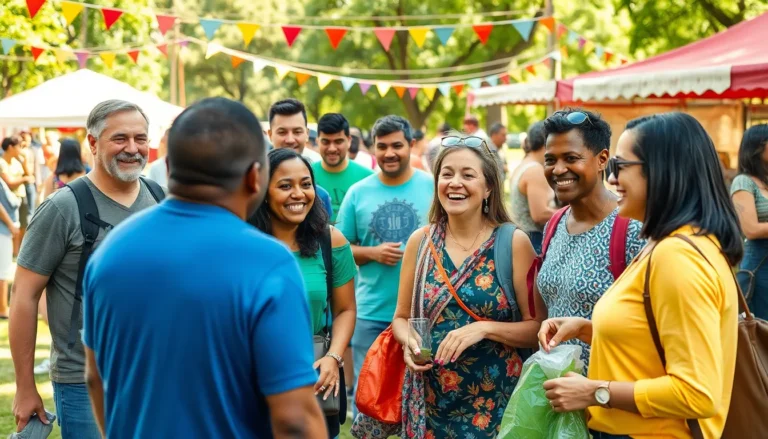Table of Contents
TogglePopular culture is the vibrant heartbeat of society, shaping trends and sparking conversations that resonate through every corner of our lives. From catchy tunes that get stuck in your head to blockbuster films that keep you on the edge of your seat, it’s the stuff that makes life a little more colorful. Whether you’re binge-watching the latest series or quoting iconic movie lines at dinner parties, popular culture is everywhere, and it’s not going anywhere anytime soon.
But what makes it so irresistible? It’s a wild mix of creativity, social commentary, and a dash of chaos that reflects the world around us. It’s the memes that make us laugh, the fashion that makes us feel fabulous, and the music that gets our feet tapping. Dive into the world of popular culture, and discover the trends, phenomena, and quirks that keep society buzzing and connected.
Overview of Popular Culture
Popular culture reflects the tastes and interests of the general public. It encompasses a wide array of expressions, including music, film, television, fashion, and literature. Music trends often shape identity and inspire movements. Major film releases can dominate discussions and influence societal norms.
Television series often become cultural touchstones, bringing diverse stories into the mainstream. Fashion trends frequently signify values and beliefs, with styles evolving rapidly each season. Through digital platforms, sharing and accessing cultural phenomena has never been easier.
Pop culture plays a crucial role in bridging generational gaps. Characters and stories resonate across age groups, sparking dialogue and reflection. The omnipresence of social media amplifies the dissemination of cultural trends. Memes, viral challenges, and hashtags create shared experiences in real-time.
Significantly, popular culture serves as a social commentary, reflecting contemporary issues and collective anxieties. Events such as award shows often showcase not only entertainment but also highlight pertinent social discussions.
Inherently, it binds communities together, fostering connections among individuals with shared interests. The rapid pace at which trends emerge and fade indicates a dynamic landscape. Engaging with popular culture highlights preferences and influences on lifestyle choices.
Actors, musicians, and influencers wield substantial power in shaping public perceptions. Their impact extends beyond entertainment, affecting politics, social movements, and economic trends. Understanding popular culture allows individuals to navigate modern society effectively.
Key Elements of Popular Culture

Popular culture reflects the shared interests and experiences of society. It encompasses various forms of art and media, influencing lifestyles and opinions.
Music
Music serves as a powerful vehicle for expression. Genres evolve, shaping cultural identities and sparking movements. From pop to hip-hop, artists address contemporary issues, resonating with diverse audiences. Chart-topping hits often become anthems for social change. Streaming platforms enable instant access to a wide array of music, enhancing discoverability. Collaborations between artists cross genres, fostering innovation while expanding fan bases. Festivals and concerts unite fans, creating communal experiences that reinforce the connection to music culture.
Film and Television
Film and television stand out as significant elements of popular culture. Major blockbusters dominate box offices, influencing societal conversations. Streaming services have revolutionized content consumption, allowing viewers to binge-watch series at their leisure. Documentaries provoke thought on pressing issues, sparking debates and reflections among audiences. Iconic characters and quotes permeate daily conversations, illustrating the impact of visual media. Series often become cultural touchstones, marking milestones in contemporary storytelling. Award shows celebrate artistic achievements and promote discussions on diversity and representation.
Fashion
Fashion acts as a form of personal and cultural expression. It reflects societal values and evolving trends, showcasing creativity. Designers draw inspiration from various sources, including music and art, continuously reinventing styles. Streetwear trends often challenge traditional fashion norms, encouraging inclusivity and individuality. Fashion weeks around the world highlight innovative collections, generating excitement and setting trends. Social media amplifies fashion visibility, enabling influencers to shape public perceptions. Seasonal collections influence consumer buying behaviors, demonstrating the cyclical nature of fashion dynamics.
Impact of Popular Culture on Society
Popular culture significantly impacts society by shaping trends and influencing opinions. It reflects and drives the tastes of the general public, continually evolving with each generation.
Shaping Trends and Opinions
Music, films, and fashion serve as primary mediums for expressing contemporary societal views. Chart-topping songs often spark conversations about social issues, urging listeners to reflect on their values. Blockbuster movies provide narratives that resonate with audiences, pushing themes of diversity and representation. Social media amplifies these trends, allowing viral moments to reach global audiences instantly. Popular culture also influences language; phrases from songs and films seep into everyday conversations. As a result, cultural trends become benchmarks for assessing social norms and expectations.
Influence on Identity and Lifestyle
Popular culture plays a crucial role in shaping individual identities and lifestyle choices. Fashion trends allow people to express themselves and connect with like-minded individuals. Music genres help define social groups, influencing how people interact with one another. For instance, certain styles encourage movements that advocate for social change, creating a sense of belonging among fans. Media representations of various cultures and lifestyles foster awareness and appreciation for diversity. Overall, the pervasive nature of popular culture makes it a vital part of daily life, influencing personal and collective identities alike.
The Evolution of Popular Culture
Popular culture has transformed significantly over the years, reflecting societal changes and advancements. This section explores its historical context and the impact of the digital age.
Historical Context
Popular culture has roots in the early 20th century, shaping and reflecting societal dynamics. The emergence of radio and cinema in the 1920s marked the beginning of mass media’s influence. During the 1950s, rock and roll introduced a new cultural wave, resonating with youth and fostering social movements. The 1960s and 1970s saw iconic television shows that addressed contemporary issues, sparking dialogue about identity and social justice. By the 1980s, the popularity of music videos further elevated artists to new heights. Cultural phenomena evolved in tandem with historical events, illustrating how popular culture remains a mirror of society’s values and changes.
Digital Age Influence
The digital age has revolutionized popular culture through technology and social media. Streaming platforms transformed content consumption, allowing instant access and influencing viewing habits. Social media creates new ways for communities to share interests and participate in viral trends. Memes and challenges circulate quickly, engaging audiences in interactive ways. Artists now utilize platforms like TikTok and Instagram to connect directly with fans, fostering grassroots movements. Digital storytelling expands creative possibilities, enabling diverse voices to emerge. These shifts amplify cultural conversations and make popular culture more accessible and inclusive than ever before.
Popular culture remains a dynamic force that shapes and reflects societal values. Its influence extends beyond entertainment into realms like politics and social movements. As trends evolve through music, film, and fashion, they create shared experiences that connect individuals across generations.
The digital age has amplified this effect, enabling rapid dissemination of ideas and fostering community engagement. By understanding popular culture, individuals can navigate and participate in the vibrant tapestry of modern life. Embracing these cultural currents not only enriches personal experiences but also fosters a deeper connection to the world around them.




